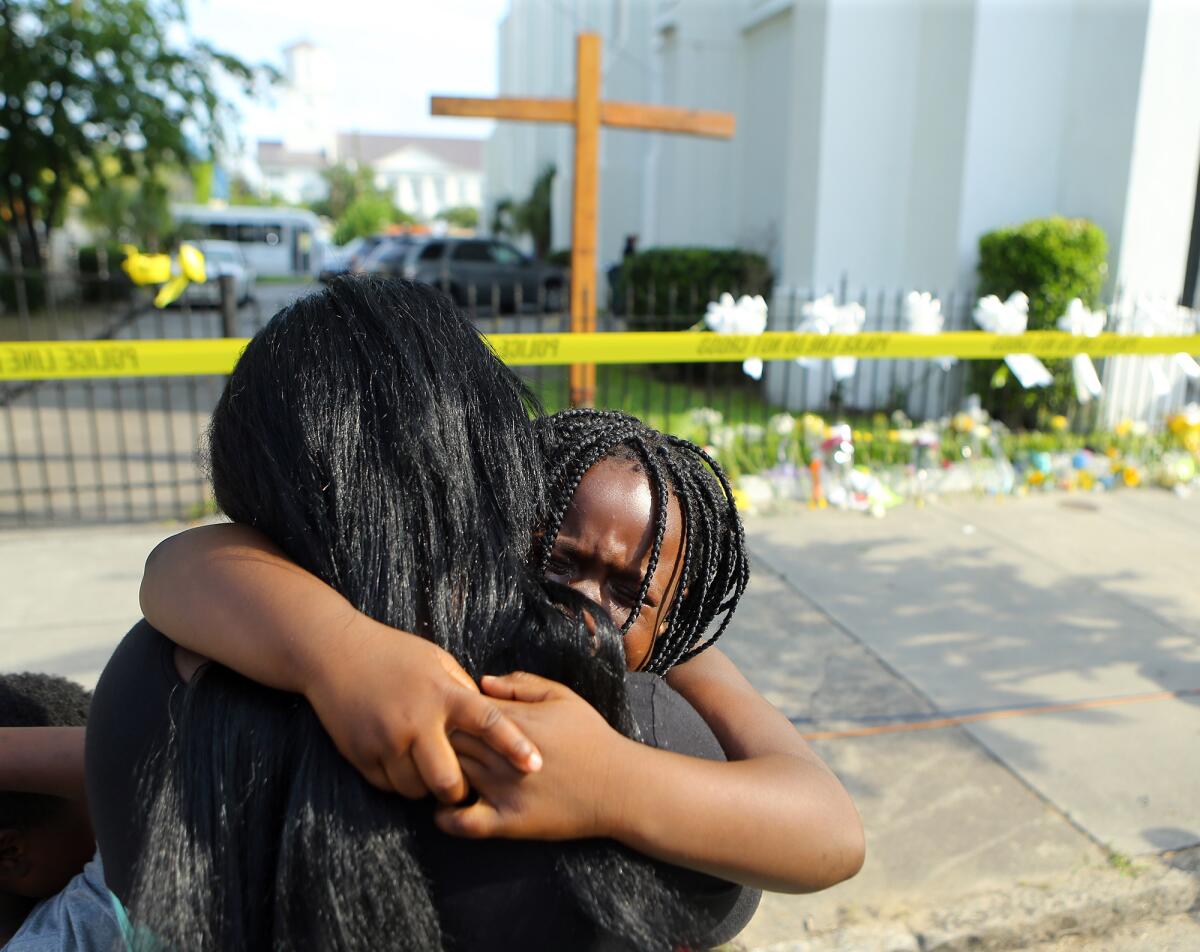Opinion: Gun and self-defense statistics that might surprise you -- and the NRA

Kearston Farr hugs her daughter Taliyah, 5, at a memorial in front of the Emanuel AME Church in Charleston, S.C., on Friday.
- Share via
As was predictable, some of the NRA crowd blames the Rev. Clementa C. Pinckney, the murdered pastor of Charleston’s Emanuel African Methodist Episcopal Church, for the deaths of eight parishioners Wednesday because as a South Carolina state legislator he supported stricter gun control (the original comment by NRA Director Charles L. Cotton seems to have been taken down, but was preserved elsewhere).
Beyond the despicable efforts to blame the victim and not the alleged gun-toting racist charged with the crimes, Cotton’s assertion reflects a common and romanticized argument by the gun lobby. If we were all armed, we would all be safe, an argument as devoid of humanity as it is of logic.
Coincidentally, just 13 hours before those atrocious killings, the Violence Policy Center released a fresh analysis of federal crime and health data that explores how often potential victims actually turned the tables. Parsing 2012 numbers, the center counted 259 justifiable gun-related homicides, or incidents in which authorities ruled that killings occurred in self-defense.
That’s in a nation in which there are some 300 million firearms, nearly one for every person (though only a little over a third of Americans own guns — and there’s an interesting take on that here, and on the ramifications of gun ownership on murder rates here, and while you’re reading links, this is of interest, too). This is also a nation in which, in 2012, there were 1.2 million violent crimes, defined as murder, forcible rape, robbery and aggravated assault. Or, put another way, 1.2 million scenarios in which there was potential for someone to kill in self-defense.
Oh, and match those 259 justifiable homicides with the theft of about 232,000 guns each year, about 172,000 of them during burglaries. That’s a ratio of one justifiable homicide for every 896 guns put in the hands of criminals.
Those 259 justifiable homicides also pale compared with, in the same year, 8,342 criminal homicides using guns, 20,666 suicides with guns, and 548 fatal unintentional shootings, according to the FBI’s Supplemental Homicide Report. The ratio for 2012, per the Violence Policy Center, was one justifiable killing for every 32 murders, suicides or accidental deaths (the ratio increases to 38-1 over the five-year period ending in 2012). That’s a heavy price to pay.
The center also dives into the thorny thicket of how often the presence of a gun stops a crime — either violent or against property, such as a burglary — from happening. The gun lobby trots out an annual figure of 2.5 million such instances. But an analysis of five years’ worth of stats collected by the federal Bureau of Justice Statistics’ National Crime Victimization Survey puts the number much, much lower — about 67,740 times a year.
It’s also useful, as the Violence Policy Center does, to dig into the relationships among the attackers and those who kill in self-defense. Over the five-year span ending in 2012, more than half — 56% — of the justifiable homicides involved strangers, and in 11% of the cases, the relationship was not reported. The rest were acquaintances (18.7%) such as neighbors and coworkers, and then a mishmash of relatives and personal relationships.
Conversely, of the 2012 criminal firearm homicides in which a relationship was reported, three out of four victims knew their killers, and more than a third were family members or “intimate acquaintances” — such as spouses, ex-spouses or others involved in a romantic relationship.
And those suicides? About half of all suicides are committed with guns, and seven in 10 by men, who also account for 74% of gun owners in the country.
Oddly, given these combined statistics, nearly half of gun owners say they keep weapons because it makes them feel safer, a proportion that has increased dramatically since 1999 even though violent crime has been in a steady decline.
So what conclusions can we draw from this? The notion that a good guy with a gun will stop a bad guy with a gun is a romanticized vision of the nature of violent crime. And that the sea of guns in which we live causes exponentially more danger and harm than good. It’s long past time to start emphasizing the “well-regulated” phrase in the 2nd Amendment.
Follow Scott Martelle on Twitter @smartelle.
More to Read
A cure for the common opinion
Get thought-provoking perspectives with our weekly newsletter.
You may occasionally receive promotional content from the Los Angeles Times.











